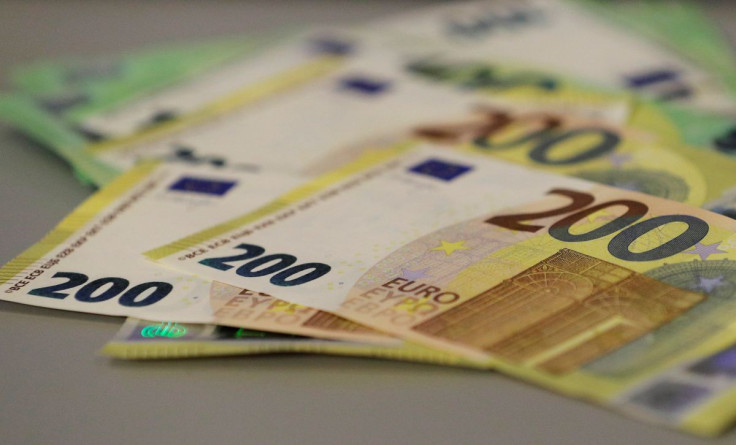Column-Might The ECB Be Tempted To Prop Up The Euro?: McGeever

The ballooning euro cost of oil and gas to record highs as war rages in Ukraine has prompted markets to murmur about the chances of a rare, even if unlikely, ECB intervention to bolster the euro against the dollar.
At first glance, it would be odd for the European Central Bank to opt for euro buying over interest rate rises to cap soaring inflation. While both effectively tighten monetary policy, the ECB has been reluctant to signal any rates move until the second half of the year at the earliest and will be careful about the economic hit as much as the inflation spur.
And while the euro has slumped against the dollar this week, exaggerating the cost of dollar-priced commodities, it's stable against a broad trade-weighted basket of currencies - still less than 5% from record highs.
There have been few signs of disorderly movements, and it has been more than 20 years since a direct euro-targeted intervention on the markets.
But in times of war and crisis, nothing can be ruled out.
The surge in commodity prices since Russian tanks rolled into Ukraine, particularly oil and natural gas, is of such a magnitude that further euro depreciation could spin an already toxic inflationary vortex out of control.
At least, that's the warning from George Saravelos, head of global currency strategy at Deutsche Bank in a note headlined: "The ECB should intervene in EUR/USD." To be clear, he says this remains unlikely and that the ECB can support the euro in other ways, like interest rate hikes or verbal intervention.
But he argues that surging energy prices are now the single biggest threat to the euro zone economy, which could unleash "a vicious inflationary spiral" that infects broader financial conditions.
Oil in euro terms is its most expensive ever. On Thursday it nudged 108 euros a barrel, up almost 25% in a week and 50% this year. Natural gas prices have more than doubled since mid-February and are up over 800% in the past 12 months.
"If financial conditions get disorderly, there is precedent for coordinated FX intervention from the G7," Saravelos says, pointing to the G7's action in 2011 to weaken the Japanese yen after the Japanese earthquake, tsunami, and Fukushima nuclear disaster in March that year.
That was the last time the ECB waded into the FX market. Before that, you have to go back to 2000 when it conducted seven bouts of euro-buying intervention worth 10 billion euros, as the fledgling currency lost almost 30% of its launch value.
Clearly, FX intervention is not something the ECB takes lightly. Since Russia invaded Ukraine the euro has weakened 2% against the dollar to $1.1050 but its trade-weighted value remains stable and strong.
FORGET IT
A weaker euro may yet pose a headache for the ECB - annual inflation is at a record high 5.8% and likely to rise further - but that seems some way off. As former ECB Vice-President Vitor Constancio points out, the exchange rate is generally not an objective of monetary policy because it is very difficult to reliably identify its drivers.
Constancio also notes that unilateral intervention is rarely effective. In that context, it is difficult to imagine the U.S. Federal Reserve getting on board a policy to weaken the dollar just when it will almost certainly be raising interest rates.
"Right now, the euro is hovering around $1.11, and there is no need or the possibility of organizing a multilateral intervention. It is better, therefore, to forget the issue," he said.
There is a building consensus, however, that the euro is heading lower. Robin Brooks, chief economist at Washington-based Institute of International Finance, reckons parity with the dollar - a 10% depreciation from current levels - could come within three months.
ECB policymakers' consistent position since the euro's launch in 1999 has been that the central bank will intervene in the currency market if it sees disorderly movements or unwarranted volatility.
That it has acted so infrequently suggests market conditions would have to deteriorate significantly for it to do so again. Implied euro/dollar volatility is spiking up toward 10%, but from a low base. It is also well below previous peaks, levels which did not trigger intervention.
But even if the euro soon trades at parity with the dollar, as the IIF's Brooks predicts, market volatility may not matter to ECB policymakers if they are facing down an oncoming recession.
"The picture in the euro zone has turned on a dime and the whole notion of second-round inflation effects is just fanciful now. ECB intervention to support the euro is counterintuitive. An effective tightening of policy makes no sense," Brooks said.
(The opinions expressed here are those of the author, a columnist for Reuters)
(By Jamie McGeever; Editing by Andrea Ricci)
© Copyright Thomson Reuters 2024. All rights reserved.




















